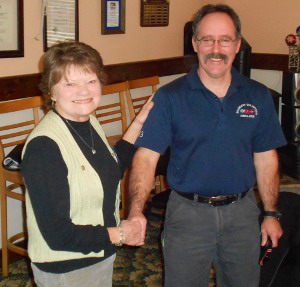|
Ambulance
chief addresses Rotary |
|
December 3, 2011 |
 |
|
Rotary Club
President Wilma DeVore welcome EMS Chief
Ken Baker as guest speaker Tuesday. |
On November 29, several Rotary members
introduced Ken Baker as their program speaker
because he's well known in the community, having
grown up in Bonners Ferry, graduating from
Bonners Ferry High School. Ken recently assumed
the leadership position as EMS Chief of the
Boundary Volunteer Ambulance.
Boundary Volunteer Ambulance (BVA) is a 501 C 3
nonprofit organization providing emergency
medical services (EMS) support to individuals in
Boundary County including facility-to-facility
transfers, extrication services, community
education (CPR, AED and first aid classes), and
the “Vial of Life” program.
With an annual operating budget of $200,000, the
organization bills third party insurers for
services rendered and recovers most of its
operating expenses. It operates five ambulances
and two service vehicles stationed at four
locations in the county.
The current needs of BVA are for additional
funding and volunteers. Although there about
8-10 active members in the organization, and BVA
needs volunteers to serve on the board of
directors and to help out as drivers, fund
raising events, etc.
Emergency Medical Technicians (EMTs) are
classified according to their level of training
– basic, intermediate or advanced. As of October
8, 2011, BVA had a roster of 38 individuals
composed of one chief EMT, 17 basic EMTs, four
advanced EMTs, six on probationary status, four
students, and six drivers.
Training for a basic EMT could cost the student
up to $1,800 for 150 hours of training plus the
additional training necessary for hazmat
classes, etc.
Walt Kirby discussed the proposal for
establishinig a taxing district to support the
ambulance service in the county. The funding,
the number of active volunteers, and the level
of sophistication concerning the equipment and
apparatus are dismal at best. The situation is
"overwhelming," according to Walt.
He described the Idaho Code as it relates to
ambulance services. The commissioners are
charged with providing ambulance services, he
said. This is currently accomplished at a cost
of approximately $8,000/year, which he called
totally unsatisfactory.
They could, he said, create a taxing district
and place the provision of ambulance services on
the tax rolls.
Currently the commissioners are analyzing the
data that would, of necessity, include employed
EMTs, and will be considering candidates for a
dynamic board of directors who know and
understand operations.
Several questions were raised relating to these
matters of life or death.
Because ambulance service is so critical to the
matters of life or death, it would appear that a
taxing district would gain wide public support.
If the funds are not there to support the
services, if the personnel are not trained
adequately or are not actively involved, and/or
if the equipment and other apparatus is
inadequate, outdated and obsolete, there appears
to be a need to move forward with a plan to
correct the deficiencies associated with the
current situation.
Additional information can be found on their
website at
http://www.boundarycountyfire.com/bv/bv.php. |
|
Questions or comments? Click
here to
email! |
|
|
|
|

